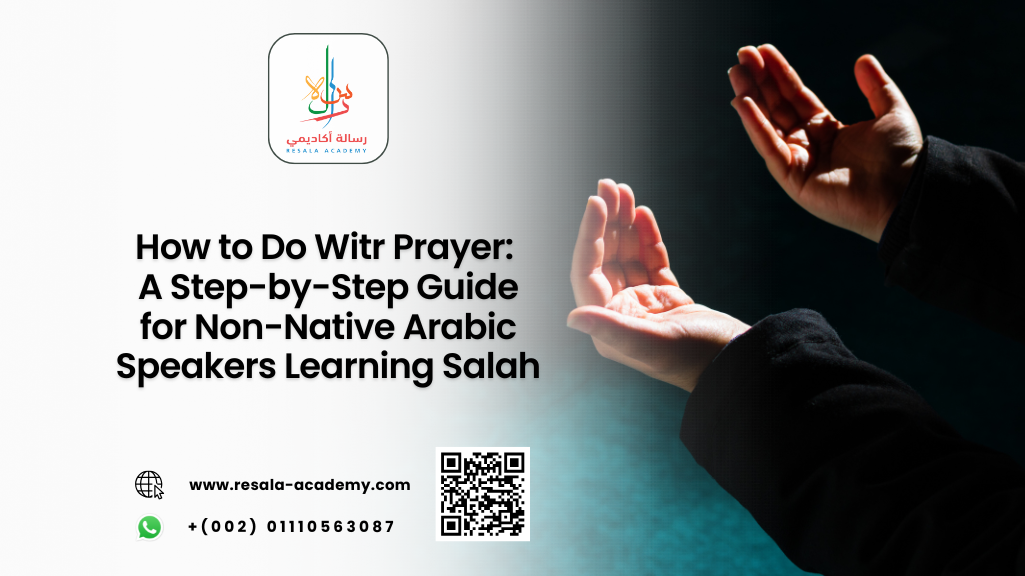Table of Contents
How to Do Witr Prayer: A Step-by-Step Guide for Non-Native Arabic Speakers Learning Salah
For many non-native Arabic speakers embarking on the journey of learning Islam, understanding and performing the Witr prayer (صلاة الوتر) can be both a spiritual milestone and a linguistic challenge.
The Witr prayer is a highly recommended Sunnah prayer that holds immense significance in the nightly worship of a Muslim. In this comprehensive guide, we will walk you through how to do Witr prayer step-by-step, with a special focus on making it accessible for learners of Arabic and Islamic practices.
Whether you’re just beginning your journey or looking to refine your understanding, this guide is tailored to help you grasp the essence, method, and beauty of Witr prayer. And if you’re looking for structured learning, Resala Academy stands as a premier online platform offering Arabic and Quran classes specifically designed for non-native speakers.
What Is Witr Prayer?
The word “Witr” (وتر) in Arabic means “odd” — referring to the odd number of rak‘ahs (units of prayer) performed. The Witr prayer is offered after the ‘Isha (night) prayer and before the Fajr (dawn) prayer. It is not obligatory (fard), but the Prophet Muhammad ﷺ never abandoned it, emphasizing its importance.
اجْعَلُوا آخِرَ صَلاَتِكُمْ بِاللَّيْلِ وِتْرًا
“Make Witr your last prayer at night.”
— Sahih al-Bukhari 998
Witr prayer is often seen as the closing act of a Muslim’s nightly worship, a spiritual seal that completes the day.
Why Is Witr Prayer Important?
- It is a Sunnah Mu’akkadah (confirmed Sunnah), meaning the Prophet ﷺ consistently performed it.
- It strengthens your connection with Allah during the quiet hours of the night.
- It is a means of seeking forgiveness and mercy.
- It is an opportunity to recite powerful supplications like Dua al-Qunoot.
When to Perform Witr Prayer
Witr can be prayed any time after the ‘Isha prayer until the break of dawn (Fajr). It is best performed in the last third of the night, especially for those who wake up for Tahajjud.
مَنْ خَافَ أَنْ لاَ يَقُومَ مِنْ آخِرِ اللَّيْلِ فَلْيُوتِرْ أَوَّلَهُ وَمَنْ طَمِعَ أَنْ يَقُومَ آخِرَهُ فَلْيُوتِرْ آخِرَ اللَّيْلِ فَإِنَّ صَلاَةَ آخِرِ اللَّيْلِ مَشْهُودَةٌ وَذَلِكَ أَفْضَلُ
“Whoever fears he will not be able to get up at the end of the night, let him pray Witr at its beginning. And whoever is sure he will get up at the end of the night, let him pray Witr at its end, for prayer at the end of the night is witnessed (by the angels), and that is better.”
— Sahih Muslim 755
Explore the beautiful teachings of Islam on children’s rights in a simple, accessible guide—perfect for non-native Arabic learners seeking a deeper understanding.
How to Do Witr Prayer: Step-by-Step
There are several ways to perform Witr prayer, but the most common methods are:
Method 1: One Rak‘ah Witr
This is the simplest form and ideal for beginners.
Make the Intention (Niyyah)
Silently intend in your heart: “I intend to pray one rak‘ah Witr for the sake of Allah.”Start the Prayer
- Say “Allahu Akbar” and raise your hands.
- Recite Surah Al-Fatiha followed by another Surah (e.g., Surah Al-Ikhlas).
Complete the Rak‘ah
- Perform ruku‘ (bowing) and sujood (prostration) as in regular prayer.
- Sit for tashahhud and end with tasleem (saying “As-salamu ‘alaykum wa rahmatullah”).
Method 2: Three Rak‘ahs Witr (Most Common)
This is the most widely practiced method and includes the special supplication known as Dua al-Qunoot.
Option A: Three Rak‘ahs with One Tasleem
Pray Three Rak‘ahs Continuously
- Recite Surah Al-Fatiha and another Surah in each rak‘ah.
- After the second rak‘ah, do not say tasleem. Instead, stand up for the third rak‘ah.
Dua al-Qunoot in the Third Rak‘ah
After ruku‘ in the third rak‘ah, raise your hands and recite Dua al-Qunoot.
اللَّهُمَّ اهْدِنِي فِيمَنْ هَدَيْتَ، وَعَافِنِي فِيمَنْ عَافَيْتَ…
“O Allah, guide me among those You have guided, and grant me well-being among those You have granted well-being…”- You can learn the full dua with proper pronunciation at Resala Academy.
Complete the Prayer
- Finish with tashahhud and tasleem.
Option B: Two Rak‘ahs + One Rak‘ah Separately
Some scholars recommend praying two rak‘ahs, ending with tasleem, and then praying one rak‘ah separately.
Tips for Non-Native Arabic Speakers
Learning to pray in Arabic can be intimidating, but with consistent effort and the right resources, it becomes easier. Practical Tips:
Start with Transliteration: Use transliteration to pronounce Arabic correctly before memorizing the script.
Listen and Repeat: Use audio resources to hear the correct pronunciation and repeat after them.
Enroll in a Structured Program: Resala Academy offers personalized Arabic and Quran classes tailored for non-native speakers.
Practice with a Partner: Practicing with a fellow learner or tutor can boost your confidence.
What to Recite in Witr Prayer?
Here are some common Surahs and supplications recited during Witr:
- Surah Al-Fatiha (every rak‘ah)
- Surah Al-A‘la (87) in the first rak‘ah
- Surah Al-Kafirun (109) in the second
- Surah Al-Ikhlas (112) in the third
عَنْ عَبْدِ الْعَزِيزِ بْنِ جُرَيْجٍ، قَالَ سَأَلْنَا عَائِشَةَ بِأَىِّ شَيْءٍ كَانَ يُوتِرُ رَسُولُ اللَّهِ صلى الله عليه وسلم قَالَتْ كَانَ يَقْرَأُ فِي الأُولَى بِـ (سَبِّحِ اسْمَ رَبِّكَ الأَعْلَى ) وَفِي الثَّانِيَةِ بِـ(قُلْ يَا أَيُّهَا الْكَافِرُونَ ) وَفِي الثَّالِثَةِ بِـ (قُلْ هُوَ اللَّهُ أَحَدٌ ) وَالْمُعَوِّذَتَيْنِ .
“Abdul-Aziz bin Juraij said: “I asked Aishah about what (recitation) Allah’s Messenger would perform Al-Witr with. She said: ‘In the first, he would recite: Glorify the Name of your Lord the Most High, in the second: Say: O you disbelievers!, and in the third: Say: Allah is One” and, Al-Mu’awwidhatain.”
— Sunan al-Tirmidhi 463
The Spiritual Benefits of Witr Prayer
- Closes your day with remembrance of Allah
- Strengthens your relationship with the Qur’an
- Brings tranquility and peace to your heart
- A chance to make heartfelt dua in solitude
Integrating Arabic Learning into Your Witr Prayer Practice
For non-native speakers seeking to master both the pronunciation and comprehension of Arabic within their nightly worship, incorporating Arabic learning directly into their Witr routine can be transformative. Here’s how to enhance your understanding while performing Witr:
Learn Arabic Vocabulary Through Prayer: Each time you perform Witr, focus on one or two Arabic words from the surahs or Dua al-Qunoot, such as “اهدِنَا” (guide us) or “عَافِنِي” (grant me well-being). This method builds your vocabulary contextually.
Use Witr as a Language Reinforcement Tool: Repeating the same surahs in Witr, like Surah Al-Ikhlas, helps reinforce pronunciation and memorization. This repetition is a powerful technique for language retention.
Connect Arabic Grammar to Prayer Structure: Understanding verb forms and sentence structure in phrases like “اللَّهُمَّ اهْدِنِي” (O Allah, guide me) deepens your grasp of Arabic grammar while enriching your spiritual experience.
Practice with Native Tutors: Resala Academy offers expert-led sessions where students can dissect the Arabic used in Witr, helping them internalize both the linguistic and spiritual meaning.
Advanced Insights into the Spiritual Dimensions of Witr
Beyond its procedural aspects, understanding how to do Witr prayer also involves exploring its deeper spiritual layers, which are often overlooked by beginners. These insights can elevate your nightly worship:
Witr as a Gateway to Nightly Reflection: The stillness of the night makes Witr an ideal time for introspection. It’s a moment to reflect on your day, seek forgiveness, and realign your intentions with sincerity.
Personalizing Your Supplication in Witr: While Dua al-Qunoot is traditionally recited, you can also add personal duas in your language after the prayer, making Witr a more intimate act of devotion.
Witr as a Bridge Between Ritual and Relationship: Performing Witr consistently transforms it from a ritual into a relational act—one where you communicate directly with Allah, seeking guidance and mercy in your voice.
Strengthening Taqwa (God-consciousness) Through Witr: Regularly performing Witr cultivates mindfulness of Allah, especially when done with understanding. This heightened awareness is a key goal of both Salah and Islamic education.
By integrating these advanced insights and language-learning strategies, non-native speakers not only learn how to do Witr prayer correctly but also experience it as a deeply personal and spiritually enriching practice.
From Confusion to Confidence: Learn with Resala Academy
If you’re struggling to pronounce Arabic correctly, memorize essential Surahs, or understand the meanings behind your prayers, Resala Academy is your trusted companion on this journey.
At Resala Academy, you’ll find:
🧑🏫 Qualified native Arabic-speaking teachers
📚 Structured courses in Arabic, Quran, and Islamic Studies
🕰️ Flexible schedules for learners worldwide
🎧 Interactive learning tools and one-on-one sessions
Don’t just learn how to pray — understand what you’re saying and why. Join Resala Academy today and transform your spiritual routine into a meaningful experience.
Frequently Asked Questions (FAQs)
1. Is Witr prayer obligatory?
No, Witr is not obligatory but highly recommended (Sunnah Mu’akkadah). The Prophet ﷺ never left it, even while traveling. It is a sign of devotion and consistency in worship.
2. Can I pray Witr if I missed ‘Isha?
You must first pray the ‘Isha prayer before performing Witr. If you missed ‘Isha, make it up and then perform Witr afterward.
3. Can I pray Witr without knowing Arabic?
Yes, you can start by learning the transliteration and gradually memorizing the Arabic. Courses like Resala Academy’s Islamic program specialize in helping non-native speakers learn correct pronunciation and meaning.
4. What if I forget Dua al-Qunoot?
If you forget to recite Dua al-Qunoot, your prayer is still valid. You can say any heartfelt supplication in your language, although learning the Arabic version is encouraged.
5. Can I pray Witr sitting down?
Yes, if you are unable to stand due to illness or another valid reason, you may pray sitting down. However, standing is preferred if you’re able.
Conclusion
Learning how to do Witr prayer is more than just mastering a ritual — it’s about deepening your connection with Allah, especially during the quiet hours of the night. For non-native Arabic speakers, this journey can be both challenging and rewarding. With the right guidance, resources, and dedication, Witr can become a cherished part of your nightly routine.
Let Resala Academy be your guide in this spiritual and linguistic journey. Their expert instructors, tailored programs, and supportive community are designed to help you not only perform your prayers correctly but also understand and feel every word.
Begin your journey today — because every night is a new opportunity to connect with your Creator.




